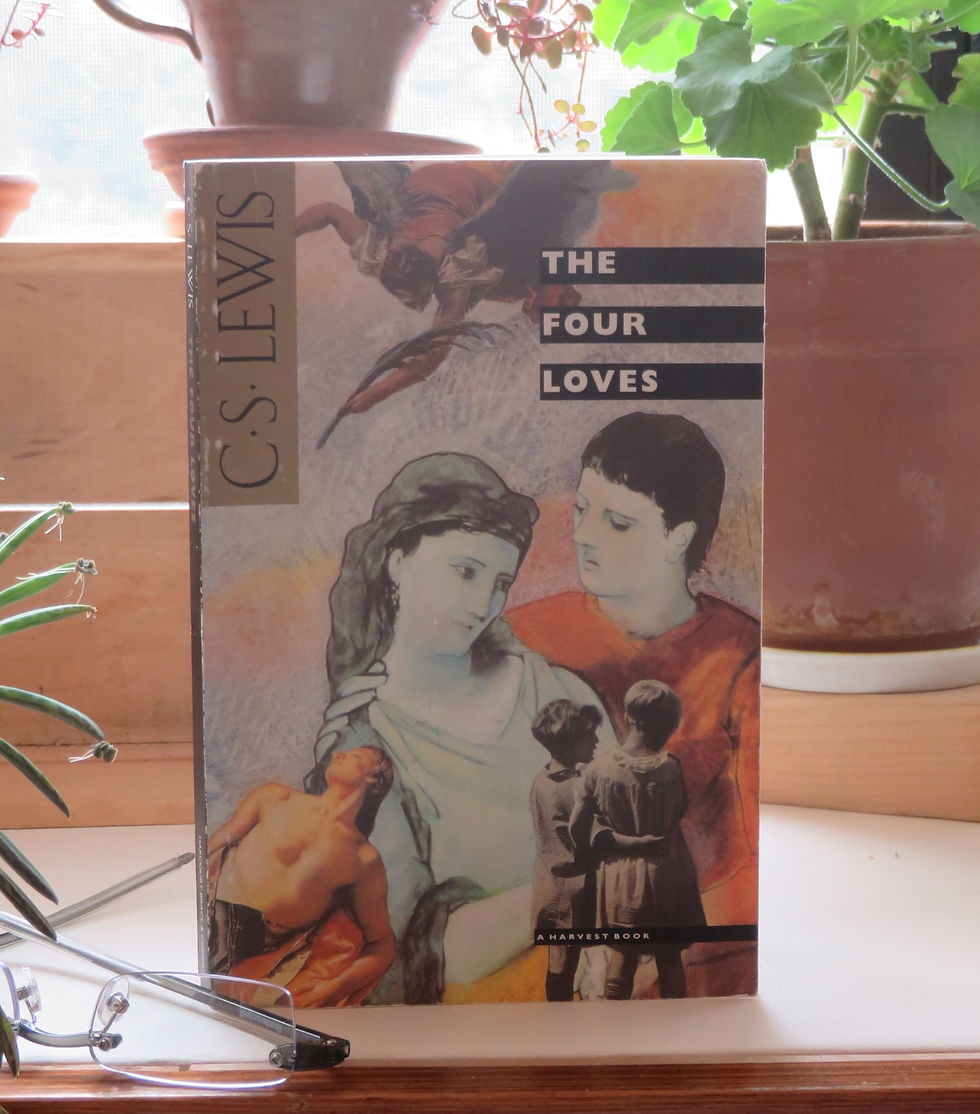T H E F O U R L O V E S
- CFR Sisters
- Jul 22, 2021
- 3 min read
Updated: Jul 24, 2021
Friday Book Pick: The Four Loves by C.S. Lewis

A few weeks ago, I saw video footage of the President and First Lady preparing to depart for their first overseas trip. Parting from classic and customary (though unwritten) dressing protocol for First Ladies, there was something written on the back of Jill Biden’s jacket. The word was LOVE.
My 27-year-old nephew signs his notes and emails “All love.”
Love (or some shadow of it) seems the topic of the majority of music written and produced –crossing all genres from country to hip-hop and all else.
St. John tells us with startling simplicity, “God is Love.” And St. Paul holds up love as the only thing that gives meaning to our life (1 Cor. 13:1-3).
In today’s Book Pick, The Four Loves by C.S. Lewis, we find a thoroughly excellent contribution to understanding this sought after, and greatly needed, eternal virtue. Even though in English we are limited to the one word by which we mean the full spectrum of loves, the Greek language generously provides four words to our one. The four types of love recognized by the Greeks and expounded upon by Lewis are: affection (storge), friendship (philia), romance (eros), and charity (agape).

Lewis, like a good spiritual director to his readers, indicates the aims and the pitfalls, the light and the shadows. He takes as his premise that while God is love, love is not God, and any love that becomes a god unto itself becomes in fact a demon. He shows that as good and natural and beautiful as love is—all the loves are—when taken too far, when distorted into an end in itself, becomes its opposite: the good becomes bad, the natural unnatural, beautiful becomes hideous.
Lewis treats love of nature, love of country, and even love of pets! He gives a thorough treatment of friendship (this chapter will likely cause any feminist readers to bristle—be warned) and a realistic and lofty treatment of romance, and finally, the pinnacle of charity. The types of love obviously—and wonderfully—overlap. Try to imagine a romantic love that is not sustained by affection, deepened by friendship and elevated by charity.
The Four Loves was published in 1960 following a series of talks Lewis gave for BBC radio. Lewis was 30 years a Christian by this point of his life, having come to Theism in 1929, “In the Trinity Term of 1929 I gave in, and admitted that God was God, and knelt and prayed….” And two years later Lewis came to a firm conviction that Jesus Christ was in fact Who He claimed to be: the only begotten Son of God. Seasoned by his pursuit of holiness, this historian and literary genius was able to become a convincing spiritual voice, highlighted toward the end of this treatise on love—the climax of the book—where Lewis admonishes his readers to vulnerability and risk when it comes to love.

“There is no safe investment. To love at all is to be vulnerable. Love anything, and your heart will certainly be wrung and possibly be broken. If you want to make sure of keeping it intact, you must give your heart to no one, not even to an animal. Wrap it carefully round with hobbies and little luxuries; avoid all entanglements; lock it up safe in the casket or coffin of your selfishness. But in that casket—safe, dark, motionless, airless—it will change. It will not be broken; it will become unbreakable, impenetrable, irredeemable. The alternative to tragedy, or at least to the risk of tragedy, is damnation. The only place outside Heaven where you can be perfectly safe from all the dangers and perturbations of love is Hell.”
To love means to risk suffering, but love also yields life. And all that is truly motivated by love will last forever. As Saint Paul teaches us, “These three remain: faith, hope and love. But the greatest of these is love.”
-Mother Clare
This is the fifth in a series on the books by the great English author C.S. Lewis (1898-1963).




